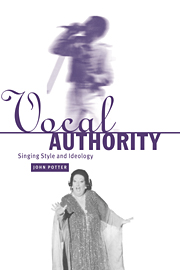Book contents
- Frontmatter
- Contents
- Preface
- Acknowledgements
- Chapter 1 Classical ideology and the pre-history of singing
- Chapter 2 The medieval period: religion, literacy and control
- Chapter 3 The Italian baroque revolution
- Chapter 4 The development of the modern voice
- Chapter 5 Concerts, choirs and music halls
- Chapter 6 Armstrong to Sinatra: swing and sub–text
- Chapter 7 Early music and the avant-garde: twentieth-century fragmentation
- Chapter 8 Elvis Presley to rap: moments of change since the forties
- Chapter 9 Singing and social processes
- Chapter 10 Towards a theory of vocal style
- Notes
- List of references
- Index
Chapter 5 - Concerts, choirs and music halls
Published online by Cambridge University Press: 22 September 2009
- Frontmatter
- Contents
- Preface
- Acknowledgements
- Chapter 1 Classical ideology and the pre-history of singing
- Chapter 2 The medieval period: religion, literacy and control
- Chapter 3 The Italian baroque revolution
- Chapter 4 The development of the modern voice
- Chapter 5 Concerts, choirs and music halls
- Chapter 6 Armstrong to Sinatra: swing and sub–text
- Chapter 7 Early music and the avant-garde: twentieth-century fragmentation
- Chapter 8 Elvis Presley to rap: moments of change since the forties
- Chapter 9 Singing and social processes
- Chapter 10 Towards a theory of vocal style
- Notes
- List of references
- Index
Summary
The creation of a stylised form of singing for opera and concerts is not in itself responsible for the way in which we understand classical singing as being ‘classical’, an elite form. The ideological significance of the term has been created largely since the eighteenth century by the contexts in which certain types of music have been heard and the tastes and class of those who formed the actual or potential audiences. Evolving taste hierarchies based largely on criteria of class became significant markers of the relationship between the elite and popular varieties of singing. Differences between the two were further exacerbated by the tendency to see music, and in particular the teaching of singing, in terms of discipline. Discipline was itself perceived as an aspect of morality, and the link between these two sociological forces was a vital one in forging the claims of classical singing to its unique status. This link is particularly obvious in the more institutional types of entertainment such as music hall and the popular choral movements. In the present day, the discipline with which singing pedagogy is pursued is one of the most important markers of classical singing. A systematised pedagogy is almost entirely absent from popular singing, and this polarisation can be dated in many respects to late eighteenth- and nineteenth-century ideology.
So far I have examined the development of the elite form of singing to the point in the nineteenth century where it is defined by the term ‘classical’.
- Type
- Chapter
- Information
- Vocal AuthoritySinging Style and Ideology, pp. 67 - 86Publisher: Cambridge University PressPrint publication year: 1998



